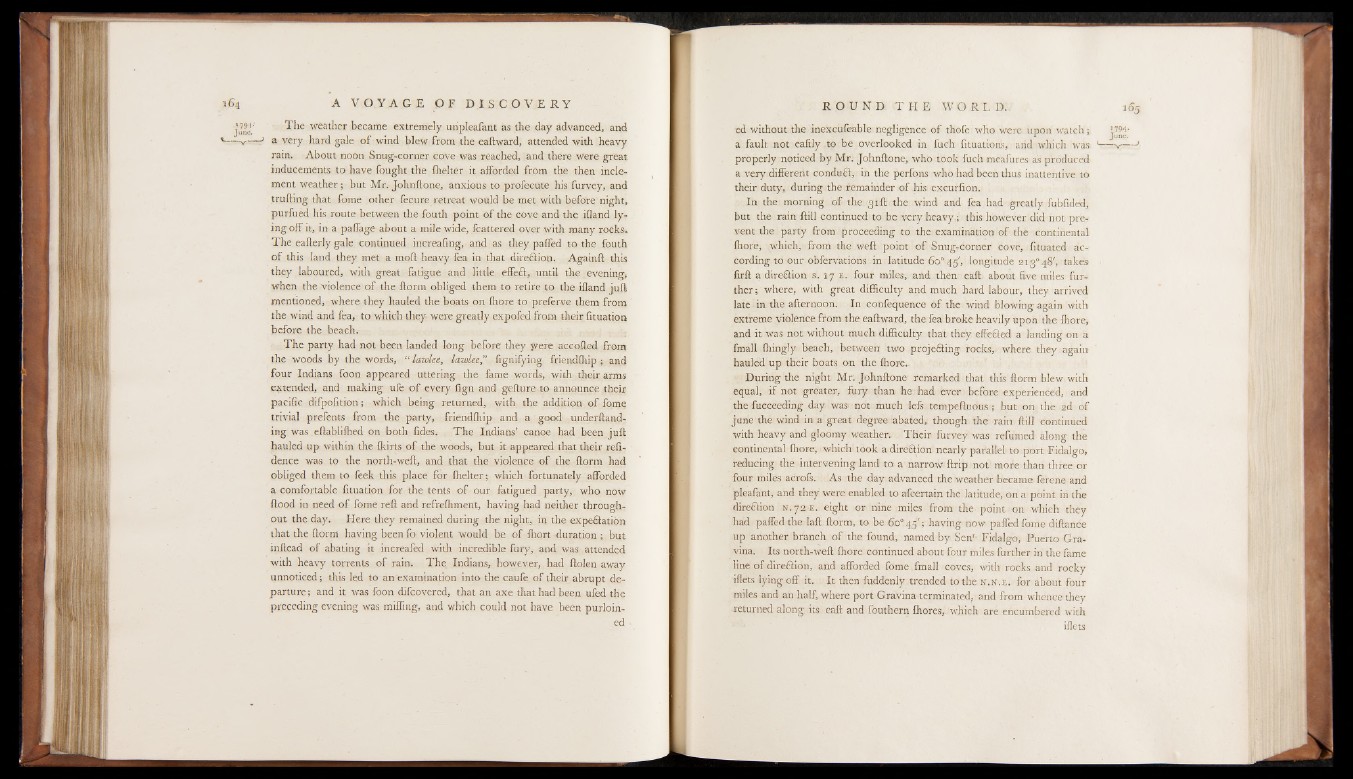
The weather became extremely uripleafant as the day advanced, and
a very hard gale of wind blew from the eaftward, attended with heavy
rain. About noon Snug-corner cove was reached, and there were great
inducements to have fought the fhelter it afforded from the then inclement
weather; but Mr. Johnftone, anxious to profecute his furvey, and
trading that fome other fecure retreat would be met with before night,
purfuéd his route between the fouth point of the cove and the illand lying
off it, in a paffage about a mile wide, fcattered over with many rocks.
The eafterly gale continued increafing, and as they paffed to the fouth
of this land they met a moll heavy fea in that direction. Againft this
they laboured, with great fatigue and little effect, until the evening,
when the violence of the ftorm obliged them to retire to the illand juft
mentioned, where they hauled the boats on fhore to preferve them from
the wind and fea, to which they- were greatly expofed from their fituation
before the beach.
The party had not been landed long before they jvere accofted from
the woods by the words, “ lazvke, lawlee” Signifying friendlhip ; and
four Indians foon appeared uttering the fame words, with their arms
extended, and making ufe o f every fign and gefture to announce their
pacific difpofition ; which being returned, with the addition of fome
trivial prefents from the party, friendlhip and a good underftand-
ing was eftablilhed on both fides. The Indians’ canoe had been juft
hauled up within the Ikirts.of the woods, but it appeared that their refi-
dence was to the north-weft, and that the violence of the ftorm had
obliged them to feek this place for Ihelter; which fortunately afforded
a comfortable fituation for the tents of our fatigued party, who now
Hood in need o f fome reft and refrelhment, having had neither throughout
the day. Here they remained during the night, in the expectation
that the ftorm having been fo violent would be of Ihort duration ; but
inftead of abating it increafed with incredible fury, and was attended
with heavy torrents of rain. The Indians, however, had llolen away
unnoticed; this led to an examination into the caufe of their abrupt departure;
and it was foon difcovered, that an axe that had been ufed the
preceding evening was milling, and which could not have been purloined
ed without the inexcufeable negligence of thofe who were upon watch; j794-
a fault not eafily to be overlooked in fuch fituations, and which was '----vr—
properly noticed by Mr. Johnftone, who took fuch meafures as produced
a very different conduit, in the perfons who had been thus inattentive to
their duty, during the.remainder of his excurfion.
In the morning of the 3 1 f t the wind and fea had greatly fubfided,
but the rain Hill continued to be very heavy,; this however did not prevent
the party from proceeding to the examination of the continental
Ihore, which, from the weft point o f Sniig-corner cove, fituated according
to our obfervations in latitude 6o° 45', longitude 213° 48', takes
firft a direction s. 1 7 e . four miles, and . then- eaft about five miles further
; where, with great difficulty and much hard labour, they, arrived
late in the afternoon. In confequence of the wind blowing again with
extreme violence from the eaftward, the fea broke heavily upon the Ihore,
and it was not without much difficulty that they effected a landing on a
fmall Ihingly beach, between two projecting rocks, where they again
hauled up their boats on the fhore.
During the night Mr. Johnftone remarked that this ftorm blew with
equal, if not greater, fury than he had ever before: experienced, and
the fuceeeding day was not much lefs tempeftpdus ; but on the 2d of
june the wind in a great degree abated, though the rain Hill continued
with heavy and gloomy weather. Their furvey was refumed along the
continental Ihore, which took a direction' nearly parallel to port Tidal go,
reducing the intervening land to a narrow ftrip not more than three or
four miles acrofs. As the day advanced the weather became ferene and
pleafant, and they were enabled to ascertain the latitude, on a point in the
direction n . 7 2 -e . eight or nine miles from the point on which they
had paffed the laft, ftorm, to be. 60° 45'; having now paffed fome diftance
up another branch of the found, named by: Sen'- Fidalgo, Puerto Gra-
vina. Its north-weft Ihore. continued about four miles further in the fame
line of direction, and afforded fome fmall coves, with rocks and rocky
iflets lying off it. It then fuddenly trended to the n . n . e . for about four
miles and an half, where port Gravina terminated, and from whence they
-returned along its eaft and fouthern fttores, which are encumbered with
iflets